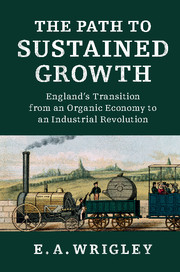 The Path to Sustained Growth
The Path to Sustained Growth Book contents
- Frontmatter
- Dedication
- Contents
- List of figures
- List of tables
- Acknowledgements
- Introduction
- 1 Organic economies
- 2 The classical economists
- 3 Energy consumption
- 4 Urban growth and agricultural productivity
- 5 Changing occupational structure and consumer demand
- 6 Demography and the economy
- 7 Transport
- 8 England in 1831
- 9 The completion of the industrial revolution
- 10 Review and reflection
- Bibliography
- Index
2 - The classical economists
Published online by Cambridge University Press: 05 January 2016
- Frontmatter
- Dedication
- Contents
- List of figures
- List of tables
- Acknowledgements
- Introduction
- 1 Organic economies
- 2 The classical economists
- 3 Energy consumption
- 4 Urban growth and agricultural productivity
- 5 Changing occupational structure and consumer demand
- 6 Demography and the economy
- 7 Transport
- 8 England in 1831
- 9 The completion of the industrial revolution
- 10 Review and reflection
- Bibliography
- Index
Summary
For those living in the centuries after an event that changed the nature of their society fundamentally, achieving an understanding of how the world appeared to their ancestors living at the time of its occurrence is apt to be challenging. That the industrial revolution changed societies fundamentally is evident to people today, but not to contemporaries. The very fact that the term ‘industrial revolution’ only came into common usage towards the end of the nineteenth century is indirect evidence of this. To those living in the decades during which the industrial revolution was long supposed to have reached its climax, the possibility of prolonged, rapid growth appeared an idle fancy. It may be difficult today to appreciate the weight of arguments that had once carried conviction. But the very fact that the significance of some aspects of the changes taking place during the industrial revolution were so difficult for contemporaries to appreciate can itself be helpful in investigating its character.
Partly for this reason, the reflections of the classical economists, Adam Smith, Thomas Malthus, and David Ricardo, are instructive when seeking to understand the nature of organic economies. They were eloquent in stressing the benefits of market economies in which the state ensured the operation of a legal system that enabled entrepreneurs when assessing risk to have confidence in the enforcement of contracts. They identified the scope for the increase in productivity that could flow from specialisation of function if the size of the accessible market was enlarged, and in turn the connection between this and improvements in transport. They were conscious that developments of this sort had brought about substantial economic advance in England during the two preceding centuries. They demonstrated the economic benefits associated with what has subsequently come to be described conventionally as a capitalist economy. They are even sometimes portrayed as demonstrating the possibility of what came to be termed exponential economic growth. Yet they were explicit in rejecting such a possibility. They saw no reason indeed to suppose that the lot of the bulk of the population would be any better at the end of an expansionary cycle than it had been at its beginning. In short, they saw clearly that, unhappily, the very nature of growth in what has recently come to be termed an organic economy must eventually entail a loss of momentum and probable decline. Negative feedback must always eventually prevail.
- Type
- Chapter
- Information
- The Path to Sustained GrowthEngland's Transition from an Organic Economy to an Industrial Revolution, pp. 19 - 30Publisher: Cambridge University PressPrint publication year: 2016


